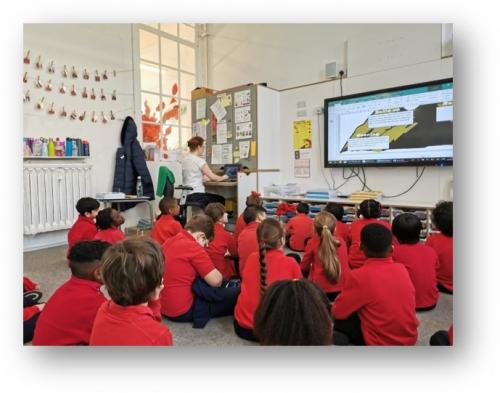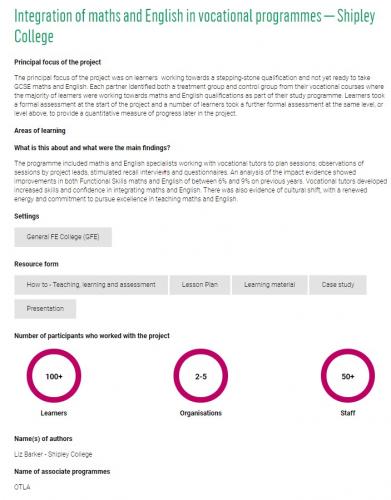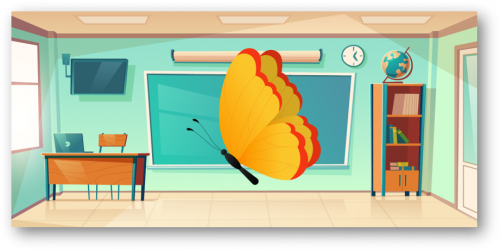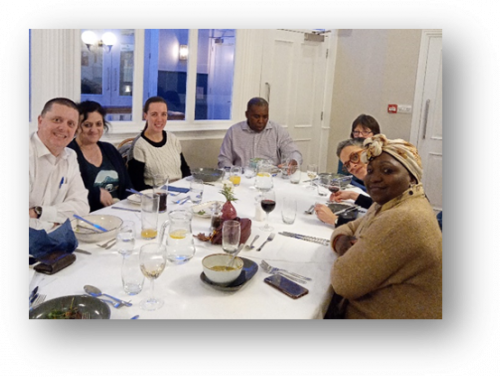
- Want to read it in the bath (or somewhere else without a screen)? Download the print-friendly PDF version here
- Want to get CUREE news direct to the desktop. Subcribe to our Enews (and other occasional notifications) here. You can unsubscribe at any time
 Contents
Contents
- Philippa's Blog
- Supporting Primary Education through the Arts
- Launch of PREP in FE and Training
- Big Leadership Adventure
- Blackpool
- Dine and Discuss
- Not Out but About
Philippa's Blog
Like so many of us, I am writing this Blog while looking out of the window from my home on the longest, loveliest spell of spring weather we've had for several years. I'm also gripped by the paradox that the same phenomena which keep me out of the office and so enables me to enjoy the weather also prevents me - and most others - from walking around in it in the company of my friends and family
However, that's about the last mention we will make of Covid, lockdowns etc as I am sure you have had quite enough of it. Instead, in this E-news, we focus on the research and development work we've been doing which we think will make a valuable contribution to your work as we gradually move towards greater normality
And what a time to write about some interesting new research about pupil wellbeing! Late in January we published a new report, sponsored by Right to Succeed, a charity dedicated to making a difference for children, teachers and communities experiencing disadvantage. We had been asked to create a map of the research findings from high quality systematic reviews of research about effective Continuing Professional Development (CPD) offered to teachers, its leadership and any links there might be with curriculum development. We were both excited and surprised by what we found!
It turns out that effective Continuing Professional Development and Learning (CPDL) for teachers and their leaders needs to ensure that:
- iterative combinations of development and learning activities are focussed on both pupils progress and their wellbeing; and
- such activities are aligned with teachers starting points and both of the development of their knowledge and skills and their professional growth.
In other words, support for enhancing both pupil and colleagues’ learning needs to be holistic and to relate to who people are as well as what they know and can do.
This feels right. We might even wonder if we needed research to tell us this. But as one head put it “although this is intuitive it is also radical”, because this is not how CPD has been framed or set up in our education system nor is it what research studies, especially those from America have been telling us for some time. Some individual randomised controlled trials investigating large scale CPD intervention in the US have increasingly pointed to failure to enhance young people’s experiences (see for example, NCE Evaluation Brief, 2016). But other international reviews of research point to much greater success (see, for example, Developing Great Teaching, Cordingley et al., 2015). This map shows that US research is actually moving in the same direction as international research - not least because it is now broadened beyond CPD inputs just from Universities and School Districts (who lead the vast majority of CPD in the US) and include CPD activities within the schools to help teachers embed what they have learned.
It is this growing awareness of the importance of focussing not just on what we teach teachers but also on their professional learning that is helping us understand in greater depth the realities of putting CPD to work in the service of our pupils. It is also this lens that brings into focus so very clearly the need to attend to the implications of the content and process of CPDL for pupil wellbeing as well as their progress; if we don’t, teachers will have to add that into the mix.
This is tricky to manage. New learning means taking risks and unlearning tried and trusted routines. A concern that an approach advocated by CPD might undermine or temporarily jeopardise pupil well-being will increase reluctance to take such approaches on board. But one which shows teachers how new approaches can enhance well-being and or scaffold the transition safely is much more likely to stick! Taking time to work out the practical, emotional and cognitive demands that new approaches make on the pupils being served by teachers and leaders is highlighted as an important CPDL leadership tool. So is giving teachers and leaders the time to work out and manage the cognitive, practical and emotional demands that new approaches will make on pupils.
It is easy to see why this matters, especially in a time of Covid-19. This research map can help you think about how to do that and to reflect on the opportunities you have to fold this in to your existing CPD successes.
Supporting primary education through the Arts
 We are approaching the end of the two year, Paul Hamlyn Foundation, Teacher Development Fund and the wonderful experience of providing formative evaluation to the 6 fantastic projects. Especial highlights have been:
We are approaching the end of the two year, Paul Hamlyn Foundation, Teacher Development Fund and the wonderful experience of providing formative evaluation to the 6 fantastic projects. Especial highlights have been:
- a terrific March visit to the awesome Charles Dickens Research School to see their brilliant use of drama techniques in a literacy lesson based on the Pied Piper of Hamlyn. We especially enjoyed the use of freeze frame to prompt the children to explain the mime position they were in and also what their characters were thinking and feeling and why. This gave children lots of scope for exploring a wider range of sometimes difficult feelings and motivations non judgmentally - secure in the knowledge that the frame (and the feelings) would also move on; something that seemed especially helpful to those experiencing the greatest disadvantage. We were awed too by the depth with which the whole class recalled Julius Caesar from a programme of study in September and October.
- learning that schools in two of the projects have put learning through the arts right at the centre of their learning from home projects for lock down.
We can’t help feeling that the CPDL and school development sitting at the heart of these projects about supporting learning through the arts for pupils experiencing disadvantage will make a rapid and substantial difference in re-annealing school communities in June or September and in helping pupils experiencing disadvantage to overcome any learning loss or intensified disadvantage arising from missing school.
PREP Launched – a new research and evidence resource for FE and Training practitioners
 CUREE has been working with the Education and Training Foundation (ETF) for around 9 months to develop a single point of access to the wealth of practitioner generated research resources created over several years. ETF, and its predecessors, have a long history of supporting practitioner research and this has been energised even more in recent years as they built practitioner and collaborative enquiry into several CPD programmes such as the Outstanding Teaching and Learning Programme (OTLA) now into its sixth phase.
CUREE has been working with the Education and Training Foundation (ETF) for around 9 months to develop a single point of access to the wealth of practitioner generated research resources created over several years. ETF, and its predecessors, have a long history of supporting practitioner research and this has been energised even more in recent years as they built practitioner and collaborative enquiry into several CPD programmes such as the Outstanding Teaching and Learning Programme (OTLA) now into its sixth phase.
The two key objectives were to make:
- the practitioner resources easy to find, and
- the process of looking through a lot of material to find the stuff of interest to you quick and efficient
The PREP resources are held on the Excellence Gateway but there’s a lot of other stuff there too – nearly 8,000 resources in total. PREP provides a direct route specifically to research and evidence-based resources using a simple set of categories. It presents a list of resources which match your search criteria and, importantly, gives a short summary of the contents of that resource which can be viewed in a few seconds. The image here is an example of just such a summary – of a vocation English and maths programme in Shipley College
You will find more information about the project here. Click here to jump to PREP
Big Leadership Adventure
Big Education need no introduction as an organisation dedicated to bringing about powerful professional development and growth for educators which explores a radical and holistic vision of schooling. Over the past year or so, they have also been working to put into place a programme which supports school leaders to develop a radical culture aimed at promoting a Big Education for all. CUREE are delighted to be able to say that we have begun to work with colleagues from the Big Leadership Adventure to co-construct an approach to evaluating the leadership programme. The aims of this collaboration include creating (or adapting) practical tools to help Big Education colleagues organise, analyse and synthesise the rich data which the Big Leadership Adventure already generates. We are doing this at one level, , to help build a sustainable model for both determining the progress made by Big Leadership Adventure participants and for understanding how the programme can be developed further. But the aim is also to establish an approach to interpreting and reporting formative evidence and the conclusions it is reasonable to draw from it from the Big Leadership Adventure can be diffused across the work of Big Education and beyond. The co-construction element has been particularly powerful in this project thus far, requiring the team at CUREE to think differently about evaluation so as to make the value and nature of its principles and methods apparent and accessible to all.
Blackpool
 Over the last 4+ years, CUREE has been fortunate enough to have the chance to work closely with colleagues at Right to Succeed, a charity focussed on supporting collective action to tackle burning issues in education, on a project to drive systemic improvements in literacy teaching and learning across all Blackpool secondary schools. This work has taken a variety of forms, including:
Over the last 4+ years, CUREE has been fortunate enough to have the chance to work closely with colleagues at Right to Succeed, a charity focussed on supporting collective action to tackle burning issues in education, on a project to drive systemic improvements in literacy teaching and learning across all Blackpool secondary schools. This work has taken a variety of forms, including:
- strategic planning, evaluation activities (such as applying the SKEIN Momentum (insert link to relevant page on our website) evaluation approach to the project as a means of determining local needs)
- developing an interactive, on line research route map and training Champions to use it; and
- facilitation of continuing professional development and learning in the Response to Intervention: Breakthroughs in Literacy (insert link to relevant page on our website) teaching intervention
In this way we have been able to learn a lot about the nature of the challenges facing teachers and children and young people in Blackpool schools, as well, we hope offering lots of practical, evidence-rich help. Better still we have had the good fortune to collaborate with a wide variety of brilliant, passionate people through Right to Succeed’s superb networking and engagement work. As our involvement in the project draws to a close, we are preparing to conduct a series of (of course, remote) interviews to develop a picture of where participating schools are in their journeys towards being exceptional in meeting the needs of vulnerable pupils. Our aim here is to give everyone involved an opportunity to reflect on what a substantial journey they have been on – an opportunity which, in the midst of a crisis, will hopefully provide a welcome reminder of how much colleagues have grown in skill and confidence and to help signpost ways forwards. If you’d like to know more about this long term, evidence-rich and partnership based way of working contact bart.crisp@curee.co.uk
Dine and Discuss in Ipswich
 We are hard at work adapting out Mentoring Training Programme for online delivery, something many of us are getting used to in the current lockdown restrictions. As part of our programme in Ipswich to provide schools and colleagues with mentoring training for newly qualified teachers, CUREE held Dine & Discuss events to host the participants and encourage networking. Unfortunately, due to the Covid-19 restrictions, we were unable to go ahead with our third Dine & Discuss event in March but are planning to run this as soon as it is safe to do so.
We are hard at work adapting out Mentoring Training Programme for online delivery, something many of us are getting used to in the current lockdown restrictions. As part of our programme in Ipswich to provide schools and colleagues with mentoring training for newly qualified teachers, CUREE held Dine & Discuss events to host the participants and encourage networking. Unfortunately, due to the Covid-19 restrictions, we were unable to go ahead with our third Dine & Discuss event in March but are planning to run this as soon as it is safe to do so.
We hosted our colleagues at two restaurants in Ipswich: Bistro on the Quay and Arlington’s. Jill Wilson and Eileen Allpress were on hand at the events to help answer questions about mentoring and coaching, and we got some great feedback from the participants too!
“This is the best CPD that I have had, for ages!”
We also heard from the participants that they wanted more of the Dine & Discuss events, that they valued the opportunity to work with colleagues from different phases, and how valuable the ‘residential’ session at the start of the course was to building team spirit and networking opportunities between them
Not Out but Still About; Where in the world is Philippa Cordingley?
Well, obviously, the answer here is stuck in her house with 80% of the rest of the population! Our busy CPDL and keynotes calendar has, of course been radically modified/postponed. Nonetheless, we are still out and about virtually in May, June and July and some of the events have been moved into the Autumn Term. Here are some of them
- 10th May – virtual keynote - CPD Connect Up series
- 19th May – 21st May – Blackpool Ks3 Literacy Project final interviews with Literacy leads
- 27th May –Advisory Group for the Teacher Development Fund
- A series of three one-hour Virtual Mentoring CPDL sessions in May, June and July for the Ipswich Opportunity Area Mentoring Training (14th May, 21st May, 22nd May, 28th May, 2nd June, 4th June, 9th June, 11th June, 16th June, 18th June, 25th June, 1st July)
- 18th June – Tony Little Centre Committee meeting
- Virtual Cohort Learning Day for the Teacher Development Fund
- 7th July – Big Education Trustees’ meeting
- 8th July – Ipswich Celebration event - ( may be postponed until Autumn as we want to do this face to face)
- 21st – 23rd September – NPQEL events - The Outstanding Leaders Partnership & Best Practice Network
- 21st October – Teaching and Learning Summit
- 3rd December - Teacher Recruitment and Retention Strategy: Lessons for your Workplace
And she is active in the virtual world in other ways. Here are a couple of published examples:
- Metamorphosis: Using re-entry as a springboard for helping vulnerable primary school pupils fly
- Developing Great Leadership of CPD and Curriculum Development - presentation to the Teachers' Development Trust #CPDConnectUp
